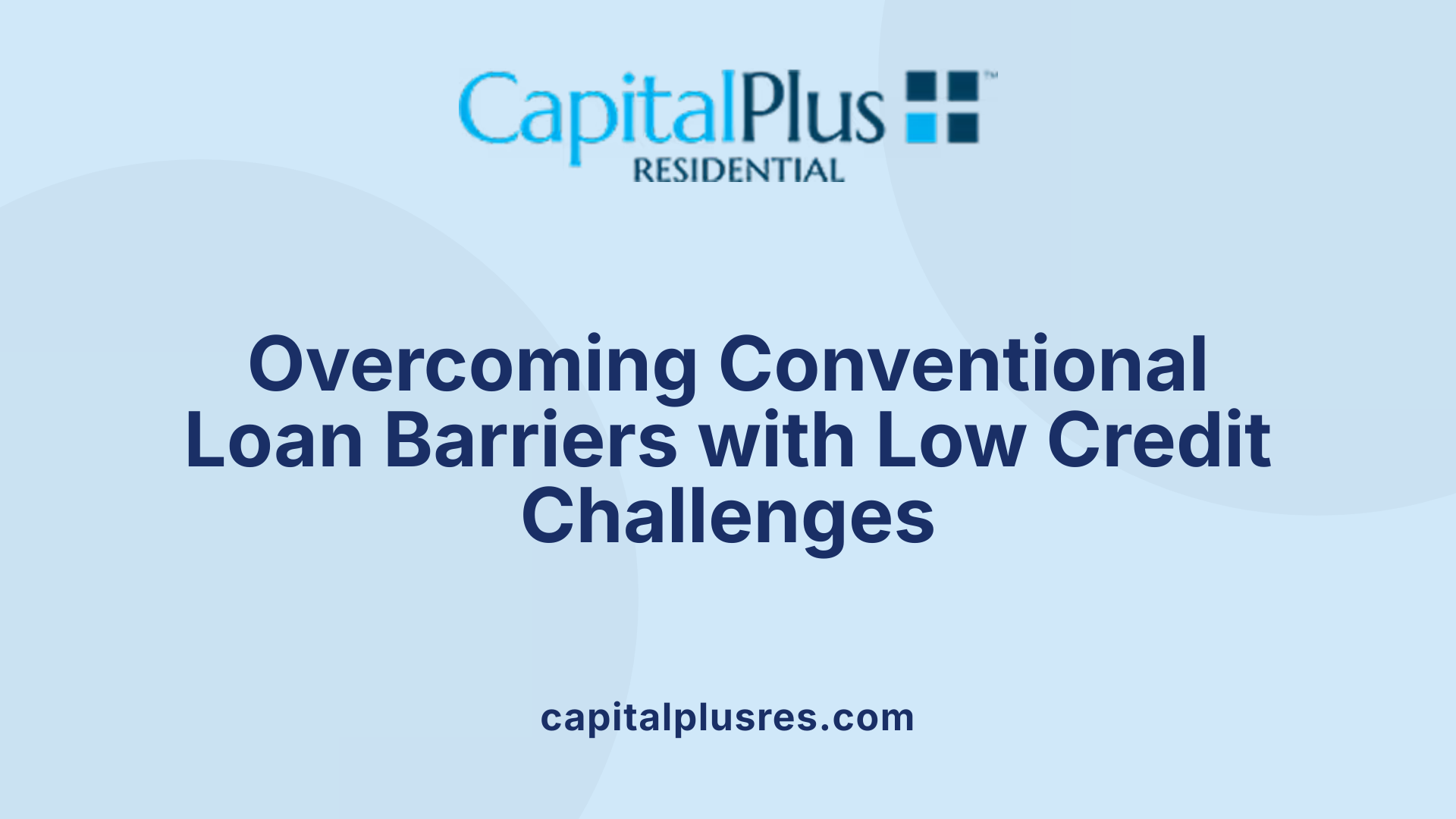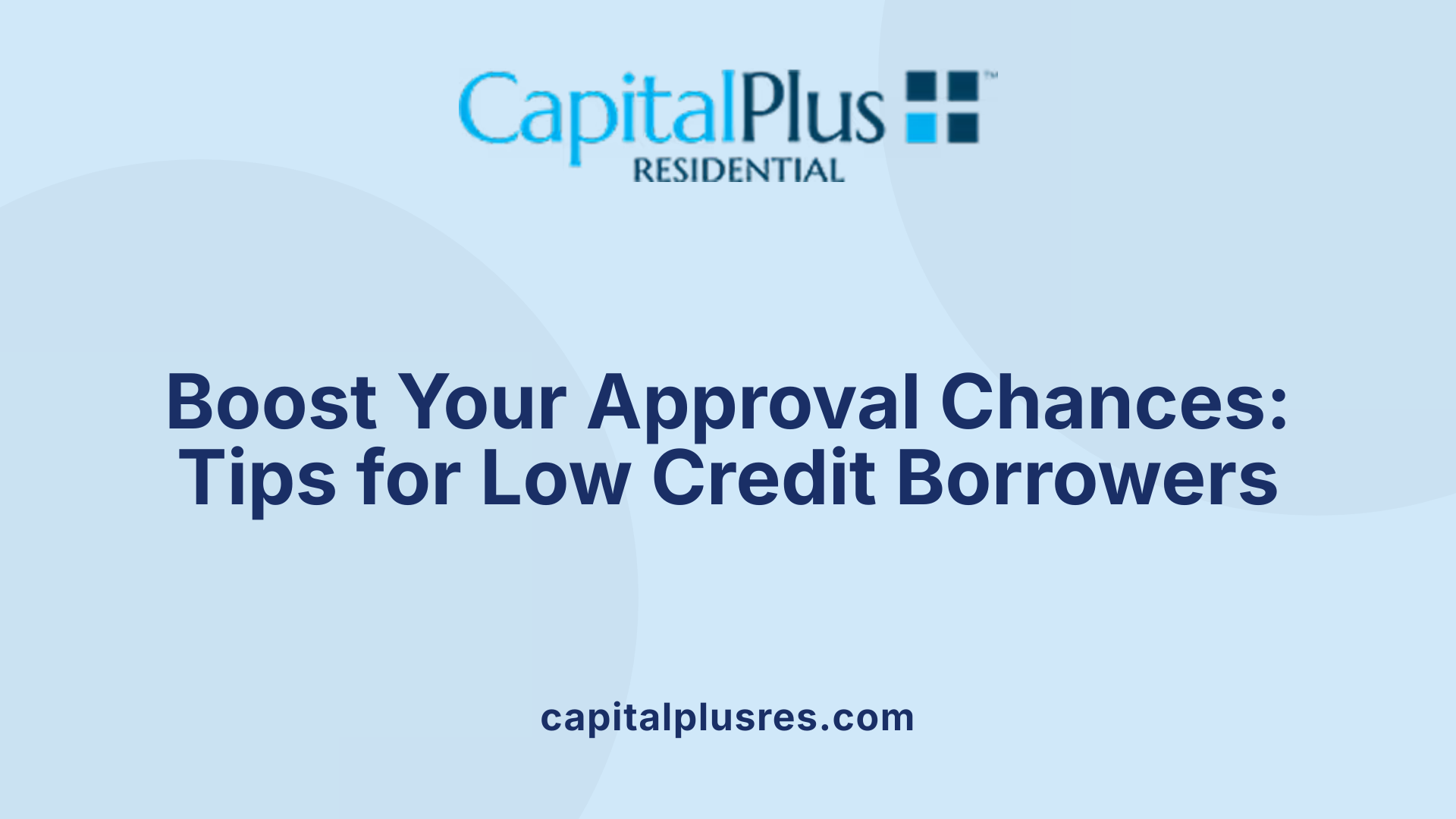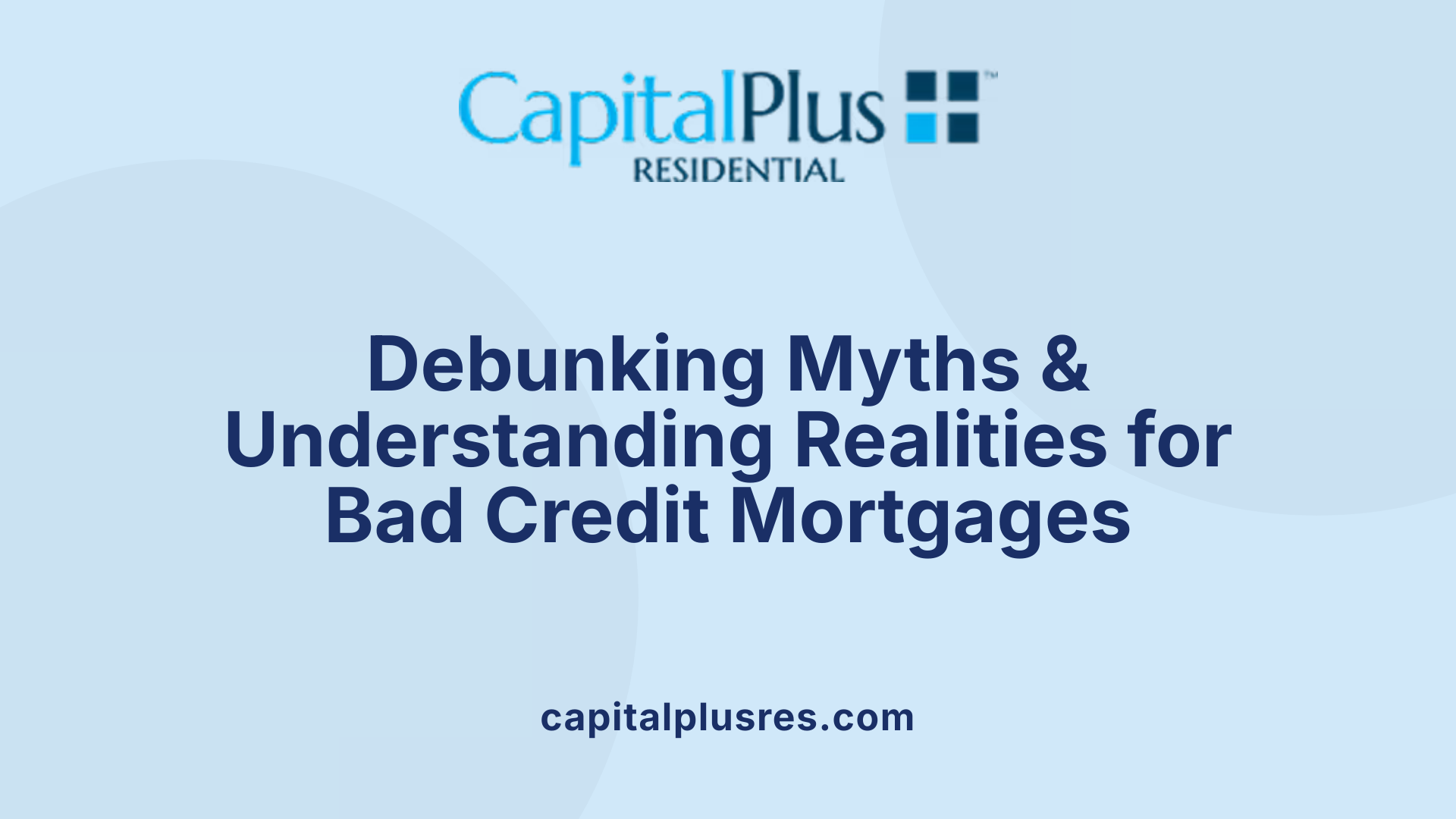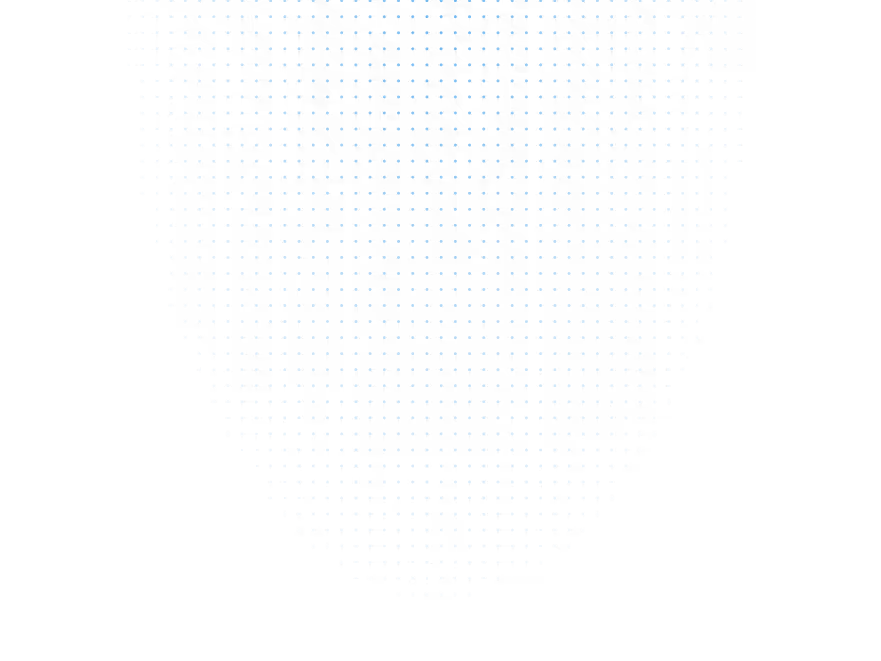Understanding Mortgage Challenges for Low Credit Buyers
Purchasing a home can be daunting for buyers with low credit scores, but various mortgage options and strategies exist to ease the path to homeownership. This article explores accessible loan programs, lender criteria, and practical tips to help low-credit borrowers secure a mortgage.
Overview of Mortgage Options for Low Credit Scores
What mortgage options are available to buyers with low credit scores?
Buyers with low credit scores have several mortgage options, primarily revolving around government-backed loans. The most common types include FHA, VA, and USDA loans. These options typically have more flexible credit requirements compared to conventional loans, making them accessible to those with less-than-perfect credit.
Types of loans available to borrowers with low credit scores
FHA Loans: These loans, insured by the Federal Housing Administration, allow credit scores as low as 580 with a down payment of 3.5%. Some lenders extend FHA loans to applicants with credit scores as low as 500, provided they make a larger down payment (up to 10%). FHA loans are particularly popular for first-time homebuyers and individuals recovering from credit challenges.
VA Loans: Available to veterans, active duty servicemembers, and eligible surviving spouses, VA loans often allow credit scores lower than 620 and require no down payment. Credit score minima are not officially set but lenders generally look for scores around 580 or higher.
USDA Loans: Targeted at low- to moderate-income buyers in eligible rural areas, USDA loans provide 0% down payment options backed by a 90% loan guarantee. Although there's no strict credit score minimum, lenders typically prefer scores of 640 or above, but may consider lower scores depending on the borrower's debt management abilities.
Conventional Loans: These generally require higher credit scores around 620-640 and favor borrowers with cleaner credit histories.
Minimum credit score requirements among different loans
| Loan Type | Typical Minimum Credit Score | Down Payment Requirement |
|---|---|---|
| FHA | 580 (some lenders accept 500) | 3.5% (can be up to 10% for lower scores) |
| VA | No official minimum (commonly 580+) | 0% |
| USDA | No official minimum (typically 640+) | 0% |
| Conventional | 620-640 | Usually 3-20%, depends on lender and borrower |
Role of government-backed loans
Government-backed loans play a crucial role in providing access to homeownership for low-credit borrowers. Their unique structure provides lenders with insurance or guarantees that reduce risk, enabling more lenient credit and down payment requirements. This support broadens options for buyers who might otherwise be excluded from the mortgage market due to financial history.
Government-Backed Loan Programs: FHA, VA, and USDA Explained

What are the credit score and down payment requirements for FHA, VA, and USDA loans?
Government-backed loan programs like FHA, VA, and USDA loans are designed to assist borrowers who might struggle with traditional mortgage qualifications, especially those with lower credit scores.
FHA Loans usually require a credit score of at least 580 with a minimum down payment of 3.5%. However, some lenders accept credit scores as low as 500 if the borrower can provide a larger down payment, typically around 10%. This flexibility makes FHA loans very attractive to first-time homebuyers and those with past credit issues. FHA loans also carry the benefit of lower down payments compared to conventional loans.
VA Loans do not have an official minimum credit score requirement set by the Department of Veterans Affairs. Lenders typically prefer scores between 580 and 620, but credit standards can vary by institution. A significant advantage of VA loans is the option for eligible veterans and service members to secure loans with no down payment, making homeownership more accessible.
USDA Loans target buyers in eligible rural and suburban areas. They generally require a credit score of 640 or greater; however, there's no strict minimum credit score, provided the borrower shows the ability to manage debt responsibly. USDA loans come with no down payment requirement, making them highly beneficial for low- to moderate-income families that meet income limits and residency requirements.
Why are government-backed loans beneficial for first-time homebuyers and special groups?
These programs offer several advantages that make homeownership more attainable:
- Lower credit score requirements reduce barriers for those with imperfect credit histories.
- Reduced or zero down payment options help buyers who haven't saved large sums.
- Specific eligibility criteria like income limits or veteran status help target support to those who need it most.
- Flexibility after financial hardships such as bankruptcy or foreclosure, especially with FHA loans, allows borrowers to rebuild credit and re-enter the market sooner.
These features collectively make government-backed loans a preferred choice for first-time buyers, veterans, rural residents, and others seeking affordable home financing options despite credit challenges.
| Loan Program | Typical Minimum Credit Score | Down Payment Requirement | Notable Benefits |
|---|---|---|---|
| FHA | 580 (some lenders accept 500) | 3.5% (up to 10% if score low) | Lower down payments, accessibility after bankruptcy |
| VA | No official minimum (usually 580-620) | 0% for eligible veterans | No down payment, favorable terms for military members |
| USDA | 640 recommended (flexible) | 0% | No down payment, supports rural homebuyers |
Conventional Loan Challenges and Possibilities for Low Credit Borrowers

Can buyers with low credit scores qualify for conventional loans?
Conventional loans generally require a minimum credit score between 620 and 640 to be considered for approval. Borrowers with scores below this range typically face challenges in qualifying due to the loan's stricter underwriting guidelines.
Clean credit history advantages
A clean credit history, with fewer negative marks such as late payments or bankruptcies, significantly improves the chance of loan approval. Lenders value a strong payment track record, which reduces perceived risk and can lead to better loan terms.
Interest rates and mortgage insurance implications
Buyers with lower credit scores often face higher interest rates on conventional loans. This increases the overall cost of the mortgage over time. Additionally, conventional loans usually require private mortgage insurance (PMI) if the down payment is less than 20%. PMI premiums can add to monthly payments but may be canceled once sufficient home equity is established.
Borrowers with poor credit scores can still pursue conventional loans; however, they must be prepared for higher borrowing costs and potentially larger down payments. As a result, many low-credit borrowers find government-backed loans such as FHA, VA, or USDA loans more accessible due to their lower credit score requirements and more flexible terms.
Lender Options and Programs Supporting Low Credit Score Borrowers

Which lenders are known for accommodating borrowers with low credit scores?
Lenders such as Veterans United, Wells Fargo, Guild Mortgage, Sage Mortgage, and U.S. Bank are recognized for accommodating borrowers with low credit scores. Credit thresholds for these lenders can be as low as 500 to 580, depending on the loan product.
What loan products are available for low credit score borrowers?
Government-backed loans like FHA, VA, and USDA are frequently offered by these lenders because they have more flexible credit requirements compared to conventional loans. FHA loans typically require minimum credit scores around 580 but may accept scores as low as 500 with higher down payments. VA loans serve veterans and active service members with flexible credit qualifications, often approving applicants below 620. USDA loans target rural homebuyers and offer low-to-no down payment options with credit score expectations generally around 640, though some non-conforming options exist for lower scores.
Do lenders provide down payment assistance and alternative income verification?
Yes. Many lenders and programs provide down payment assistance to help borrowers meet minimum equity requirements, which is particularly helpful for those with low credit scores. Additionally, some lenders like Guild Mortgage and Sage Mortgage offer alternative income verification options. These approaches consider nontraditional credit and income sources to broaden mortgage eligibility beyond conventional underwriting standards.
This combination of specialized lenders, flexible government-backed loan products, down payment support, and alternative income assessments creates practical pathways for homebuyers with credit challenges to access mortgage financing.
Strategies to Improve Mortgage Approval Odds Despite Low Credit Scores

What steps can buyers take to improve their chances of mortgage approval with low credit?
Buyers with low credit scores have several effective strategies to enhance their mortgage approval prospects. First, obtaining a detailed credit report is crucial to identify and correct any inaccuracies that might be unfairly lowering their credit score. Maintaining timely bill payments and reducing overall debt balances can steadily improve creditworthiness.
Managing debt-to-income (DTI) ratio is another important tactic. Lenders prefer borrowers who have a balanced income relative to their debts, as a lower DTI demonstrates financial stability. Paying down existing debts reduces this ratio, making it easier to qualify for loans.
Saving for a larger down payment significantly strengthens a borrower's position. Down payments of 20% or more reduce the loan-to-value ratio, which can lead to better loan terms and may even eliminate the need for mortgage insurance. This also signals to lenders a lower risk.
Lastly, involving a co-signer can enhance approval chances, especially if the co-signer has a stronger credit profile. However, this approach places significant financial responsibility on the co-signer and should be considered carefully.
By combining credit score improvements, managing debts prudently, and leveraging larger down payments or co-signers, borrowers with low credit can improve their mortgage approval odds and potentially secure better rates and terms.
Financial Implications of Low Credit Scores on Mortgages
How do low credit scores affect mortgage costs and terms?
Low credit scores can significantly influence the costs and terms of a mortgage. Borrowers with scores in the subprime range (300-579) often face higher interest rates, which increase the total amount paid over the life of the loan. For example, rates increase noticeably for scores below 680, leading to thousands of extra dollars in interest.
Impact on mortgage insurance requirements
Lenders often require mortgage insurance for borrowers with low credit scores, especially when the down payment is less than 20%. This insurance protects the lender but adds to monthly payments and overall loan costs. FHA loans generally include mortgage insurance regardless of credit score, which is another cost to consider.
Influence on closing costs and discount points
Closing costs may also rise for borrowers with poor credit because lenders might require the purchase of discount points to secure a loan. Discount points increase upfront costs but can sometimes reduce the interest rate. However, borrowers with low credit scores often pay higher fees, adding to the loan's initial expense.
Savings potential by improving credit
Improving credit scores can lead to lower interest rates and the elimination of mortgage insurance (once a certain equity threshold is reached), which can save borrowers thousands of dollars throughout the mortgage term. Taking steps to increase creditworthiness, such as reducing debt and correcting credit report errors, enhances loan affordability and terms.
Specialized Loan Programs and Incentives for Unique Borrower Groups
What specialized mortgage programs exist for specific borrower groups with low credit scores?
Several specialized mortgage programs cater specifically to unique borrower groups, particularly those who may struggle with low credit scores or face financial challenges.
Indian Housing Loan Guarantee Program (Section 184): This program is tailored for American Indian and Alaska Native families, tribes, and entities. It offers options to buy, build, improve, or refinance homes with flexible credit requirements, helping these communities access homeownership despite credit challenges.
HUD’s Good Neighbor Next Door: This initiative provides substantial discounts to public service personnel, including teachers, firefighters, law enforcement officers, and emergency medical technicians. In return, participants must commit to living in the purchased home as their primary residence, which supports community development and affordable housing.
Energy-Efficient Mortgages (EEMs): EEMs assist buyers who are interested in purchasing or improving homes with energy-saving features. These loans can be particularly beneficial for budget-conscious buyers, including those with low credit scores, by helping reduce long-term utility expenses via lower mortgage costs tied to energy efficiency improvements.
These programs help expand mortgage accessibility and affordability for groups that may otherwise face obstacles due to credit score limitations or financial background. By targeting specific borrower groups and offering tailored incentives, they support homeownership opportunities with terms and requirements aligned to borrower circumstances.
Understanding Loan Eligibility Beyond Credit Scores
What other factors influence mortgage eligibility besides credit score?
While credit scores play a significant role in mortgage eligibility, lenders evaluate several other important factors to determine a borrower's overall financial profile. These include income level, existing debts, available assets, and employment history.
Role of income, debts, assets, and employment history
Lenders want to ensure borrowers have a steady income stream to comfortably make mortgage payments. They review the borrower's debt-to-income ratio, which is the total debt payments compared to income. A lower ratio indicates better financial health. Assets such as savings or investments can also be valuable for down payments and emergency funds. A stable employment history adds confidence that the borrower can maintain consistent income over time.
Income eligibility for USDA loans
USDA loans target low- and moderate-income households in designated rural areas. Applicants must meet specific income eligibility requirements, typically not exceeding 115% of the area's median household income. This criterion ensures that the program assists families who need affordable home financing options.
Importance of managing debt and demonstrating financial stability
Regardless of the loan type, demonstrating an ability to manage debt responsibly is crucial. This includes timely bill payments, keeping debt levels manageable, and showing financial discipline. Strong financial stability can help offset a low credit score and improve chances of mortgage approval.
In summary, mortgage lenders adopt a comprehensive view of a borrower's financial situation. Beyond credit scores, they focus on income consistency, debt management, available assets, and employment history to assess eligibility and reduce lending risk.
Myths and Realities About Mortgages for Bad Credit Borrowers

Are There Mortgage Loans Guaranteed for Bad Credit Borrowers?
There are no mortgage loans that guarantee approval solely based on having bad credit. Borrowers with low credit scores often seek options that minimize credit requirements, but no lender can promise approval without proper qualification. Responsible measures like improving credit scores, saving for a larger down payment, and choosing government-backed loans such as FHA, VA, or USDA increase approval chances significantly.
Risks of Unverified 'Guaranteed Approval' Schemes
Many borrowers with poor credit encounter advertisements claiming guaranteed mortgage approval. These schemes tend to be misleading and can involve high fees or unfavorable loan terms. It’s critical to be wary of such offers and rely on lenders with proven reputations and transparent qualifying criteria. Avoiding scams means working with reputable institutions that clearly outline borrower requirements.
Importance of Credit Improvement and Realistic Expectations
Improving credit health by paying down debts, correcting credit report errors, and maintaining stable employment history helps borrowers access more favorable mortgage terms. Even a small increase in credit scores can translate into lower interest rates and reduced total loan costs. While government-backed loans offer flexibility, they still require managing finances responsibly. Realistic expectations about down payments, interest rates, and eligibility are essential to a successful mortgage application journey.
Empowering Homebuyers with Low Credit Scores
Though a low credit score presents challenges, a variety of mortgage options and proactive strategies can make homeownership attainable. By understanding government-backed loans, exploring accommodating lenders, improving financial health, and maintaining realistic expectations, buyers with imperfect credit can successfully navigate the mortgage landscape and achieve their homeownership goals.
References
- 14 Best Bad Credit Home Loans of October 2025
- Home Loans For Bad Credit: Know Your Options
- Buying a house with bad credit - Home loans
- Single Family Housing Guaranteed Loan Program
- Government-backed home loans and mortgage assistance
- What Is The Lowest Credit Score To Buy A House?
- Best Mortgage Lenders For Bad Credit In 2025
- FHA Loans for Bad Credit Scores
- Bad Credit Mortgage Lenders | The Best Lenders of 2025









